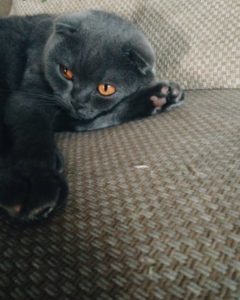Scottish Fold Insurance – Is it Worth It?
Scottish Fold Insurance – Is it Worth It?
Is Scottish Fold Insurance really worth it? Scottish Fold cats are a popular choice due to their cute folded ears where the cat takes its name. They are shorthaired which makes grooming easier, and tend to have a friendly temperament, which makes them great for families. However every breed comes with health risks and has the chance to get ill or have an accident in their lifetime, so the big question is whether you are going to you’re your cat covered under pet insurance.
In United States, less than 1% of dogs and cats have insurance, whereas in the UK more than a quarter of them are insured. When making this decision it’s important to consider health issues relating to the breed and for the Scottish Fold, this is especially important. There are also plenty of advantages and disadvantages of having pet insurance or not. Luckily I’ve compiled some information to help you make that decision on whether or not Scottish Fold insurance is for you.
Scottish Fold Health Issues
Osteodystrophy
First, when buying any pedigree cat or kitten you need to consider their long-term health risks. Breeds can come with their own problems and the Scottish Fold is no different. Although it is considered a generally healthy breed there is one  major genetic disease, which comes from the breeding itself. Breeders should generally breed one fold-eared cat and one straight-eared cat together; if two fold-eared cats are bred together it causes something called osteodystrophy.
major genetic disease, which comes from the breeding itself. Breeders should generally breed one fold-eared cat and one straight-eared cat together; if two fold-eared cats are bred together it causes something called osteodystrophy.
Osteodystrophy is an abnormality affecting cartilage in the body. This is what causes the folded ears in Scottish Fold cats for which they are named and loved so much. However, ears aren’t the only thing this defect affects. It can also seriously impact the limb bones and give the cat extreme arthritis.
This can start to appear in kittens from the age of seven weeks and can continue throughout their life, which can make some Scottish Fold cats live their entire lives in chronic pain. There is no cure and it only gets worse.
This is why when choosing a Scottish Fold cat it is important to confirm that the breeder has bred one straight-eared cat and one fold-eared cat as the cartilage issue is lessened in these circumstances. When two fold-eared cats are bred together this issue is made much worse.
Feline Polycystic Kidney Disease (PKD)
Scottish Fold cats can also be susceptible to Feline Polycystic Kidney Disease (PKD). Some extreme cases of this can mean the kitten dies before reached one year. Usually, onset occurs averagely at age seven, although it can often be between the ages of 3 and 10. Some cats can have the disease their whole lives and never show any symptoms, or only show signs later in life. Symptoms of this can include; tiredness, bad appetite, weight loss, sickness, and a bigger thirst and urine output.
Consider getting a health insurance plan for your cat. Check out PetAssure for a free quote.
Health Issues of Related Breeds
British Shorthair
The British Shorthair is a breed quite closely related to the Scottish Fold, so any health issues this breed is vulnerable to should be taken into consideration as well. British Shorthairs are susceptible to something called hyperthyroidism. The thyroid glands are working too much and producing too much thyroid hormone, which makes the cat have an increased appetite, eat a lot but keep losing weight and have a greasy coat.
thyroid glands are working too much and producing too much thyroid hormone, which makes the cat have an increased appetite, eat a lot but keep losing weight and have a greasy coat.
Sometimes this is caused by a benign tumor of the thyroid gland and requires surgery to remove it. Medication and change of diet can also help.
Another thing that can affect British Shorthair is hypertrophic cardiomyopathy. This is the most common type of heart disease to be found in cats and can be managed with medication to ensure the cat can live a normal and healthy life, although there is no cure. Symptoms of this can include a loss of appetite, tiredness, issues with breathing, and abnormal heart noises.
Chartreux
Chartreux cats, another related breed, are prone to Feline PKD much like the Scottish Fold and getting struvite stones in the urinary tract. If your cat has struvite stones you may notice they need to urinate more frequently than normal, have painful urination, and bloody or cloudy urine. Surgery can be necessary to remove the stones however they can also be managed by changing diet to try and dissolve or flush out the stones.
So now you know what kind of health issues your Scottish Fold cat may be up against, it’s time to look at what types of insurance are available and what they can cover. If you want to compare different pet insurances you can do so using Pet Insurance Review, it lets you know what’s covered and what’s not and compares prices.
Scottish Fold insurance is important to consider because of the genetic diseases that come with the cat, depending on how your cat was bred it may come with a variety of health problems that can present at any problem throughout their life. Despite the fact that your cat may seem healthy as a kitten doesn’t change that they could get ill at any point in their life.
What Does Scottish Fold Insurance Cover?
When getting insurance for your Scottish Fold pet you want to make sure the genetic conditions the breed is known for are covered, otherwise, there is little point to getting the insurance at all.

All pet insurance policies and be different, so it’s essential for you to find the right one for you. But typical things that are covered include:
Veterinary bills
When your pet becomes sick they can often require surgery, or even just check-ups and treatments from vets if they eat something they shouldn’t – it’s happened to nearly every pet owner! These can result in some costly visits to the vet, which are always partially covered by your insurance at least.
Death by an injury or sickness
Some policies will cover the purchase cost of your cat if they, unfortunately, die of an illness or an injury, although this may not apply if they make it to an old age and often a vet needs to officially certify the cause of death as an illness.
Cattery Fees
Some policies offer covering the cost of cattery or boarding fees if you find yourself unwell and needing to go to the hospital for a long period of time.
Illness or injury when traveling
There is the option to have your pet covered when you travel overseas as well, although this often needs to be starting at a certain cost of $1500 for example.
Loss and theft
This may cover how much it cost to buy your cat, you would need to have proof as well. The insurance may also cover any advertising you do to try and get your lost pet back, and the reward price as well.
When is the best time to get insurance?
Most pet insurers will only accept your kitten once it is older than 7 or 8 weeks, you can’t insure your pet before this typically. However aside from that, there is a lot of freedom as to when you can sign your pet up for insurance. Some plans  have an upper age limit like 14 years, although in the US Nationwide’s Whole Pet with Wellness plan has no upper age limit.
have an upper age limit like 14 years, although in the US Nationwide’s Whole Pet with Wellness plan has no upper age limit.
Generally, you want to insure your pet as soon as possible because some plans don’t cover pre-existing conditions and your cat is likely to get sicker the older they are.
Can you change insurance mid-policy?
Sometimes the insurer, or type of insurance, you choose at the beginning of your pets life might not be the most suitable to have later on so you might want to change the insurance provider or move onto a different policy. At this point, the best option is to initially look over the policy you have and speak to your current insurer to see if there are any changes they can make to your policy. Sometimes they are able to do this but it changes from provider to provider.
In the initial 14-day period after you’ve set up the policy they generally have a ‘cooling off’ period which means you can cancel if you change your mind for no fee whatsoever. However, if you change your mind after a few years, there can be a cancellation fee involved and you won’t get a refund for any premiums you’ve paid so far.
Insurance Available In USA
Trupanion
Trupanion will cover 90% of any eligible health expenses; it would be worth reading the small print when getting your individual quote to find out what is considered an eligible expense. For a monthly premium you would only have to pay 10% of health care expenses, the deductible and any expenses that aren’t eligible as long as you are in the US, Canada, or Puerto Rico.
Pre-existing conditions are not covered, but genetic conditions are as long as there were no signs before the enrolment date. This means your Scottish Fold hereditary conditions would be covered under this plan.
They will cover your pet for hospital stays and diagnostic tests, any medications required, and surgery. What they don’t cover are the routine appointments and preventative care you would be getting for your pet anyway, as these are costs you expect to pay as a pet owner. They also don’t cover any exam fees or sales tax.
The monthly cost is different depending on breed, the age of enrolment, gender and what deductible you choose, but you can go to their website for an individual quote.
ASPCA Pet Health Insurance
This covers you for exam fees, diagnostic tests and any treatments required. They offer an accident only plan, which covers any resulting injuries from your cat having an accident, but for an extra cost they will cover illness, any genetic diseases or hereditary conditions. They also cover rehabilitative therapy, acupuncture and physiotherapy, and any behavioral issues your pet may have resulting from anxiety or compulsive behaviors.
However they don’t cover pre-existing conditions, any cosmetic procedures like tail docking, they also won’t cover any costs from breeding or pregnancy or your annual check-up and vaccines. For a little extra per month, they will cover the preventative care.
Monthly cost begins with $16 for full coverage or $10 per month for accidents only. However, rates do vary depending on a variety of factors like location and age of your pet.
Nationwide
Nationwide offer different plans with different levels of coverage. Whole Pet with Wellness will pay for 90% of health care expenses after the deductible for any accident, injury, or illness, and this includes exam fees. There is also a 24/7 vet helpline that policyholders have access to.
Their plans cover accidents, injuries, illnesses, and any hereditary conditions. They also cover a range of alternative therapies.
Policies with Nationwide start around $12 per month. The deductible can be between $0-$1000 annually, but the most popular chose for their Whole Pet with Wellness plan is $250.
Healthy Paws
Plans with Healthy Paws cover hereditary conditions, cancer, diagnostic tests and treatments, any x-rays or ultrasounds, surgery, and hospitalization, as well as any prescription medications your pet may need when they are sick. They also cover emergency and specialty care, and a variety of different alternative treatments.
But they don’t cover pre-existing conditions, and they don’t cover the exam fees or any preventative care.
Healthy Paws costs tend to go between $15-$90 and again depends on a variety of factors.
Petplan
Petplan offers cat insurance which covers a variety of things including accidents, illness, and any veterinary examination fees. You would also get MRI and CAT scans covered under the pet insurance as well, and prescription medications. Any non-routine dental treatment is also covered as well as diagnostic tests, surgery and rehab and any special treatment that is required.
They don’t cover your routine and preventative care, or pre-existing conditions.
Plans with Petplan run between $16-$60 per month depending on the plan type you have chosen.
Insurance Available in the UK
Petplan
Petplan cover vet fees, alternative therapies like acupuncture and hydrotherapy and advertising costs if your cat goes missing. They will also cover the reward offered as well.
They offer a lifetime cover or twelve-month cover, which means if your pet gets a long-term condition or has had an accident which has resulted in a lifelong injury then Petplan will cover their treatment for 12 months but after that time period the condition will be excluded from the policy.
Animal Friends Pet Insurance
There are different levels of cover with Animal Friends, which can cover accidents, illnesses, vet fees, and have a different number of lifetime limits – the total amount you can take out for your pet. They do begin their cover for kittens as young as 4 weeks.
Pre-existing conditions are not covered, and under some policies, you can only claim for a year for a certain condition your cat may have before it also would not be covered under the insurance.
Coverage with Animal Friends begins from as little as £3.01 per month but they have a range of 12 policies to choose from with varying amounts. You can find any information you need on their website.
Churchill
Churchill covers emergency care and would give you up to £500 towards your pets purchase price if your cat passes away, and bereavement counseling. There is also access to a legal advice helpline for any policyholder. They also offer up to £1000 towards advertising and reward fees if your Scottish Fold cat gets lost or stolen,
They don’t cover pre-existing conditions or any claims that arise from an event or condition that developed in the first 10 days of the policy. Anything considered non-essential is not covered as well as your routine check-ups and vaccinations.
Churchill is offering a 30% discount for those who buy online at their website.
The list of insurance providers above is not exhaustive, there are plenty of other pet insurance policies available in both the UK and America that could suit your needs. It is worth spending some time going over whether or not you believe insurance is something you need, as there are pros and cons for it.
Benefits of Insurance
The main advantage of having Scottish fold insurance is the peace of mind that it offers. You know that you are paying a monthly fee and if your cat gets sick or injured then it should be covered, it requires a lot of work and research to make sure you are going for the insurance that is best for you and your pet but once you’ve done that you know that you are covered.
are going for the insurance that is best for you and your pet but once you’ve done that you know that you are covered.
Expensive treatments are much more manageable when you have pet insurance. Surgery, chemotherapy or radiotherapy treatment can quickly move into the region of over $10,000 whereas would generally be covered under your insurance provider. You can keep your Scottish Fold cat well cared for and prolong their life.
There are also a lot of different options for coverage now, which means you can pick and choose the insurance that works for you.
It’s impossible to predict when your pet is going to get sick, or whether or not they are going to have an accident, when you have insurance you know how much you are going to have to pay should something go wrong and can budget for this.
When you’re not covered by insurance it’s also impossible to know how much the vet is going to charge you for surgery, aftercare or even a simple check-up. With insurance, the costs are laid out in front of you and you can set money aside for it.
A huge number of vets accept pet insurance, you are unlikely to find a vet that does not, you just have to make sure there are plenty of vets surrounding your local area that accept the insurance provider you choose.
Disadvantages of Insurance
One major downside to having pet insurance is the cost, often it can be very pricey over a long period of time when you have a healthy cat who shows no signs of being sick. The fact is you may never need to make a claim, if you are one of the lucky few who has an animal that never gets ill until the very end of its life then paying $50 a month for pet insurance can be a huge amount of money to spend that you have never needed to use.
Sometimes genetic diseases the breed is specifically known for can be hard to insure and just are not covered. With Scottish Folds, you need to think about the osteodystrophy the breed is known for and try to find an insurer who would cover this genetic condition.
Older and sicker pets become harder to insure, you can’t wait until your cat gets sick and then decide to get pet insurance unfortunately as that just isn’t how it works. When you get insurance any pre-existing conditions are unlikely to be covered.
Depending on where you live insurance costs can be very high and you need to make sure you go with an insurer who has vets near you, this can be difficult for people who are in rural communities. If you go to a vet who is not part of your insurance providers then the out-of-pocket prices can be incredibly expensive.
Routine vaccinations and check-ups sometimes are not covered in insurance so you would need to set aside money for these if they aren’t covered.
Conclusion
It’s up to you whether or not insurance is going to work in your family or not, but I hope this article has assisted you in making that important decision. There are a lot of factors to consider, but ultimately you should choose what you feel is best for your cat and yourself.
Insurance can be costly, but some do feel that the peace of mind in having that safety net should the worst happen is worth the monthly cost. Unfortunately, there is no way to tell whether or not insurance would be necessary, you can’t predict an accident or illness occurring but it’s up to you how you want to prepare for anything your cat might be up against. What do you think, is Scottish Fold Insurance worth it?